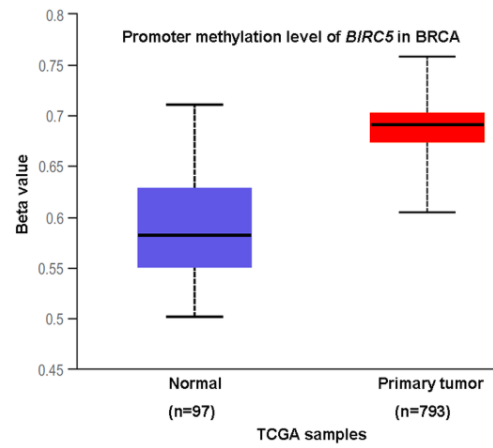BIRC5 as a potential biomarker in breast cancer
Dai J, Bei Zhu B, Lin W, Gao H, Dai H, Zheng L, Shi W, & Chen W. Identification of prognostic significance of BIRC5 in breast cancer using integrative bioinformatics analysis. Biosci Rep (2020)
How they used Xena
They used Xena to make Figure 3 where they examined BIRC5 methylation status in breast cancer patients, as well as Figure 7.

Figure 3 from the paper
Paper
Aims
Baculoviral inhibitor of apoptosis repeat containing 5 (BIRC5) plays vital roles in carcinogenesis by influencing cell division and proliferation and by inhibiting apoptosis. However, the prognostic significance of BIRC5 remains unclear in breast cancer.
Methods
BIRC5 expression and methylation status were evaluated using the Oncomine and The Cancer Genome Atlas (TCGA) databases. The relevance between BIRC5 and different clinicopathological features as well as survival information was analyzed using the bc-GenExMiner database and Kaplan–Meier Plotter. BIRC5–drug interaction network was obtained using the Comparative Toxicogenomics Database.
Results
Based on the results from databases and own hospital data, BIRC5 was higher expressed in different breast cancer subtypes compared with the matched normal individuals. Hormone receptors were negatively correlated with BIRC5 expression, whereas the Scarff–Bloom–Richardson (SBR) grade, Nottingham Prognostic Index (NPI), human epidermal growth factor receptor-2 (HER-2) status, basal-like status, and triple-negative status were positively related to BIRC5 level in breast cancer samples with respect to normal tissues. High BIRC5 expression was responsible for shorter relapse-free survival, worse overall survival, reduced distant metastasis free survival, and increased risk of metastatic relapse event. BIRC5–drug interaction network indicated that several common drugs could modulate BIRC5 expression. Furthermore, a positive correlation between BIRC5 andcell-division cycle protein 20 (CDC20) gene was confirmed.
Conclusion
BIRC5 may be adopted as a promising predictive marker and potential therapeutic target in breast cancer. Further large-scale studies are needed to more precisely confirm the value of BIRC5 in treatment of breast cancer.